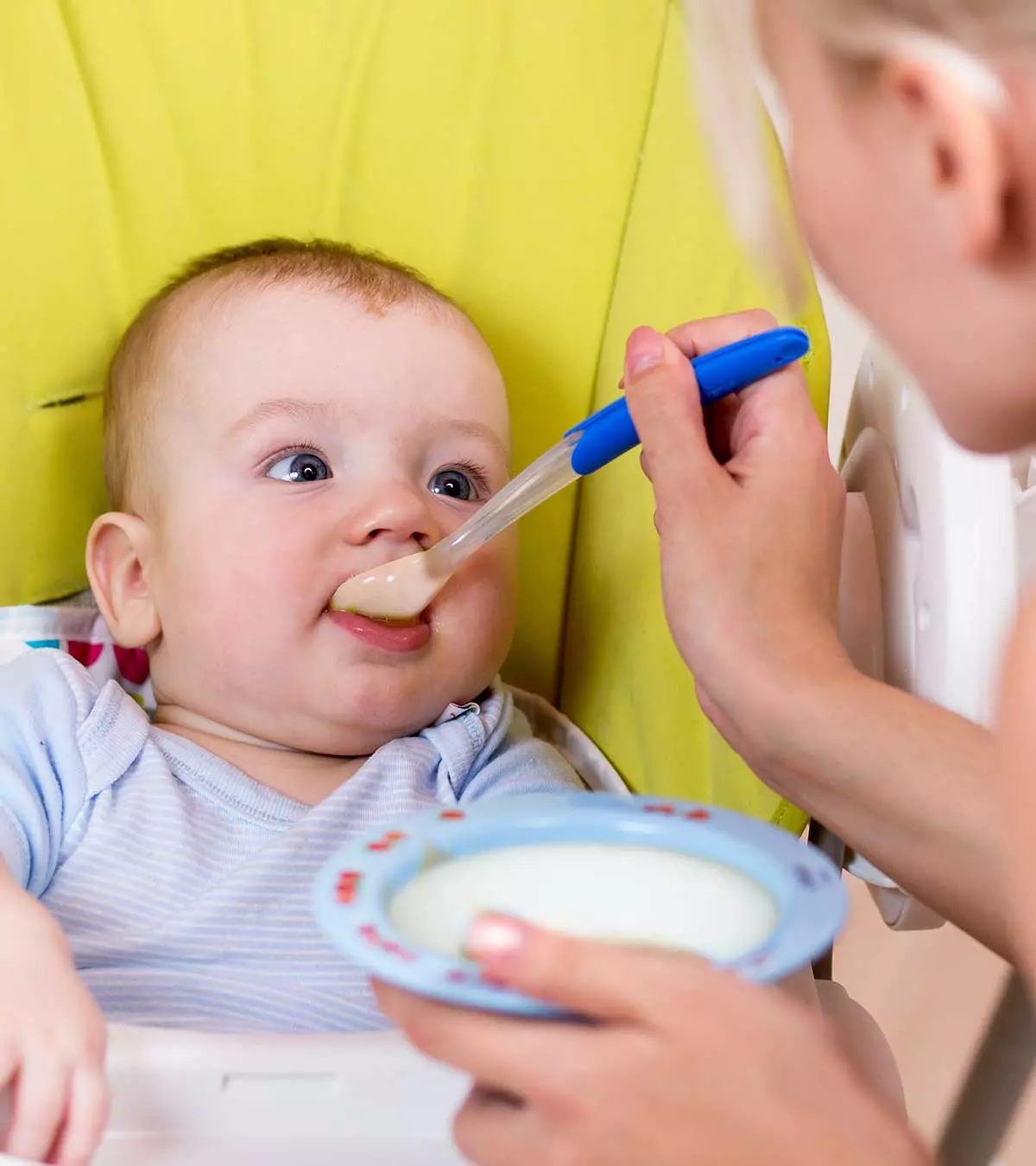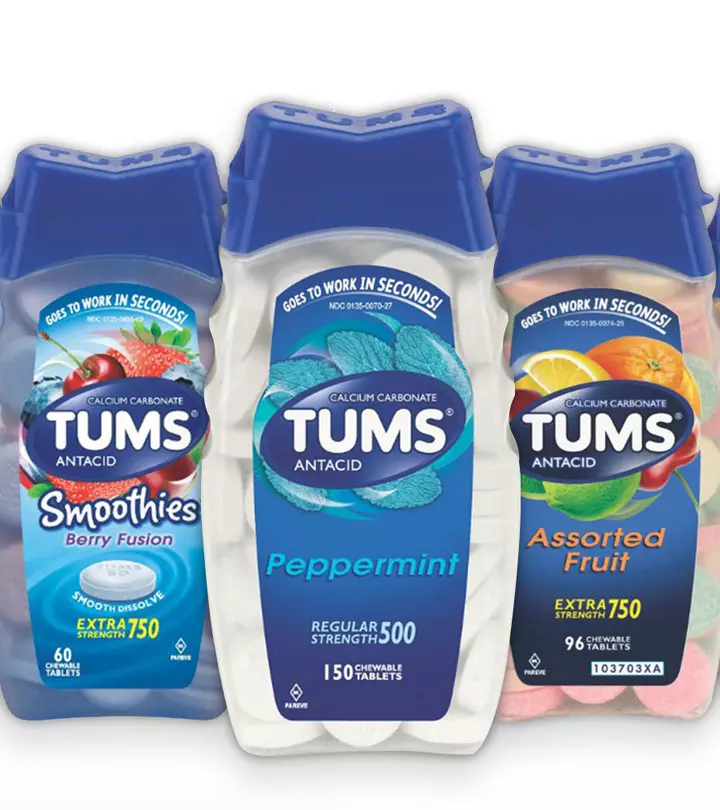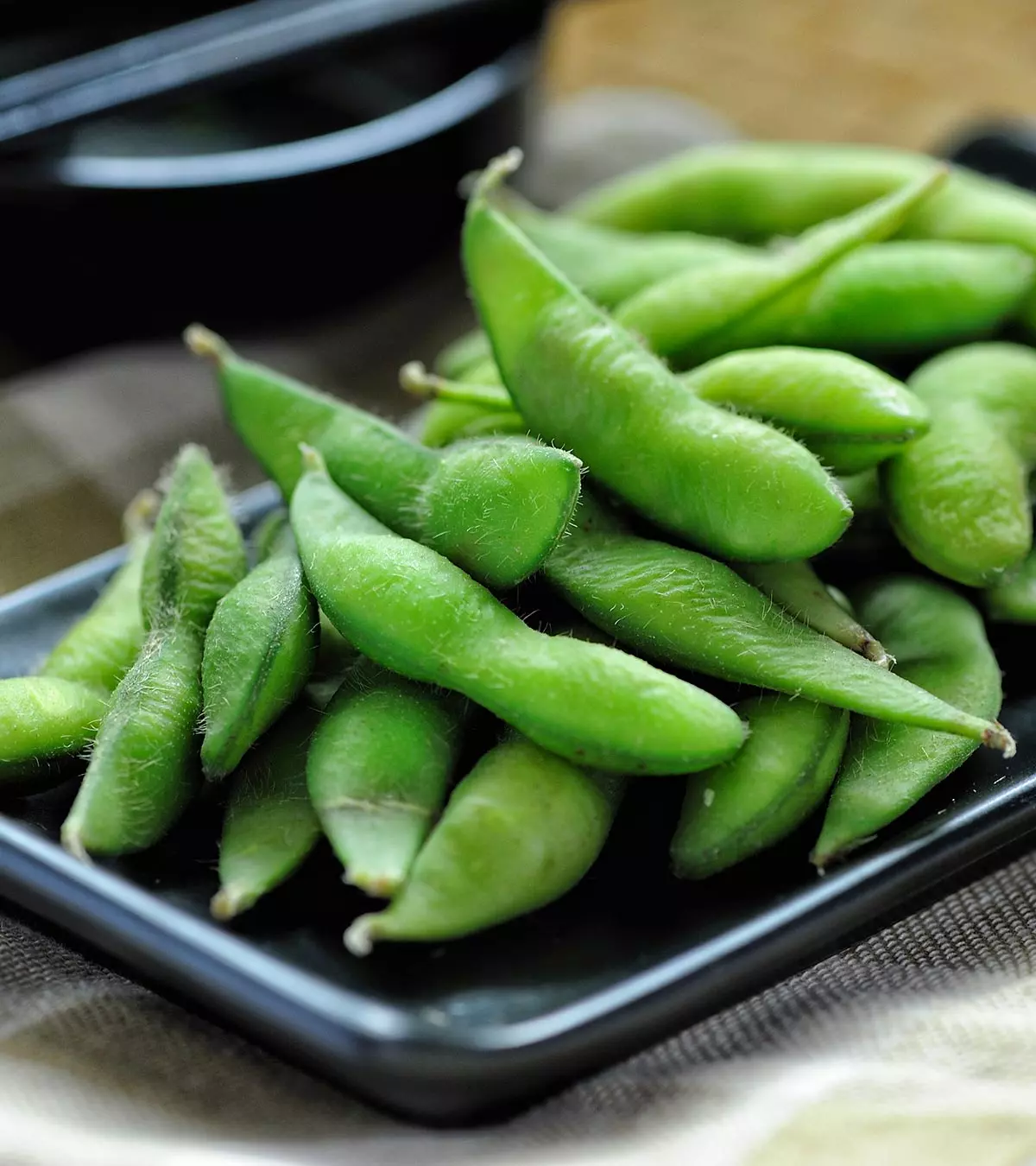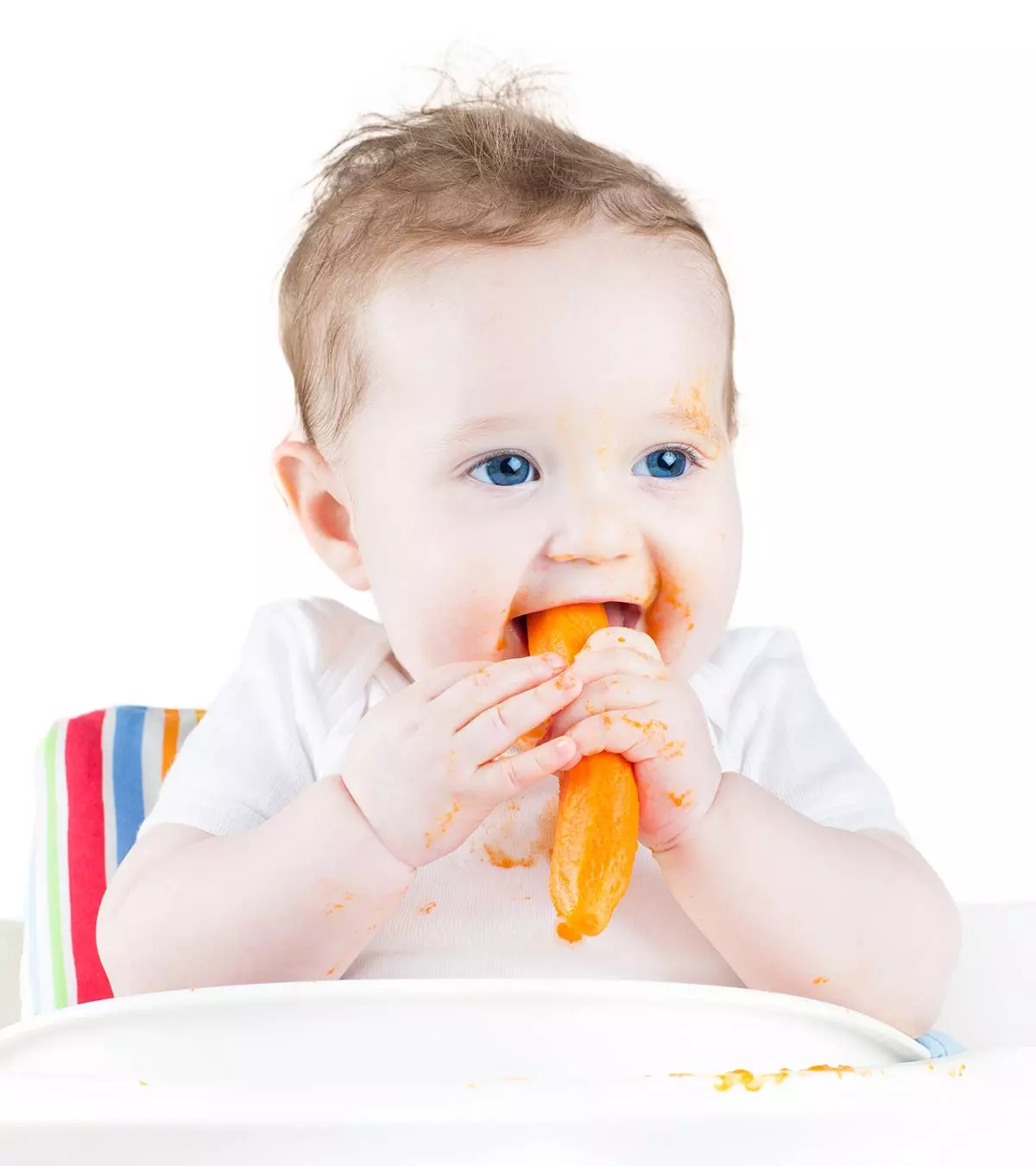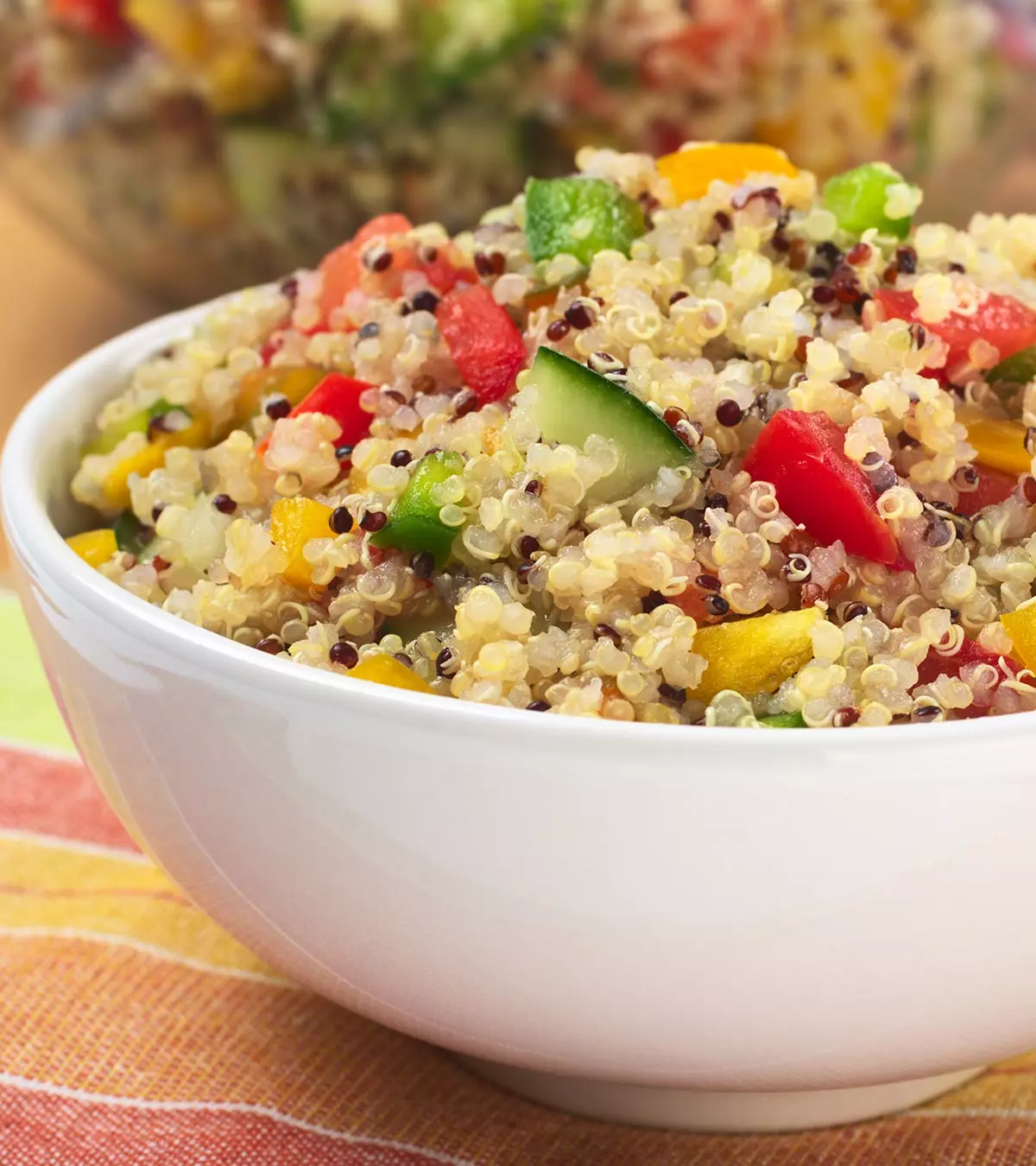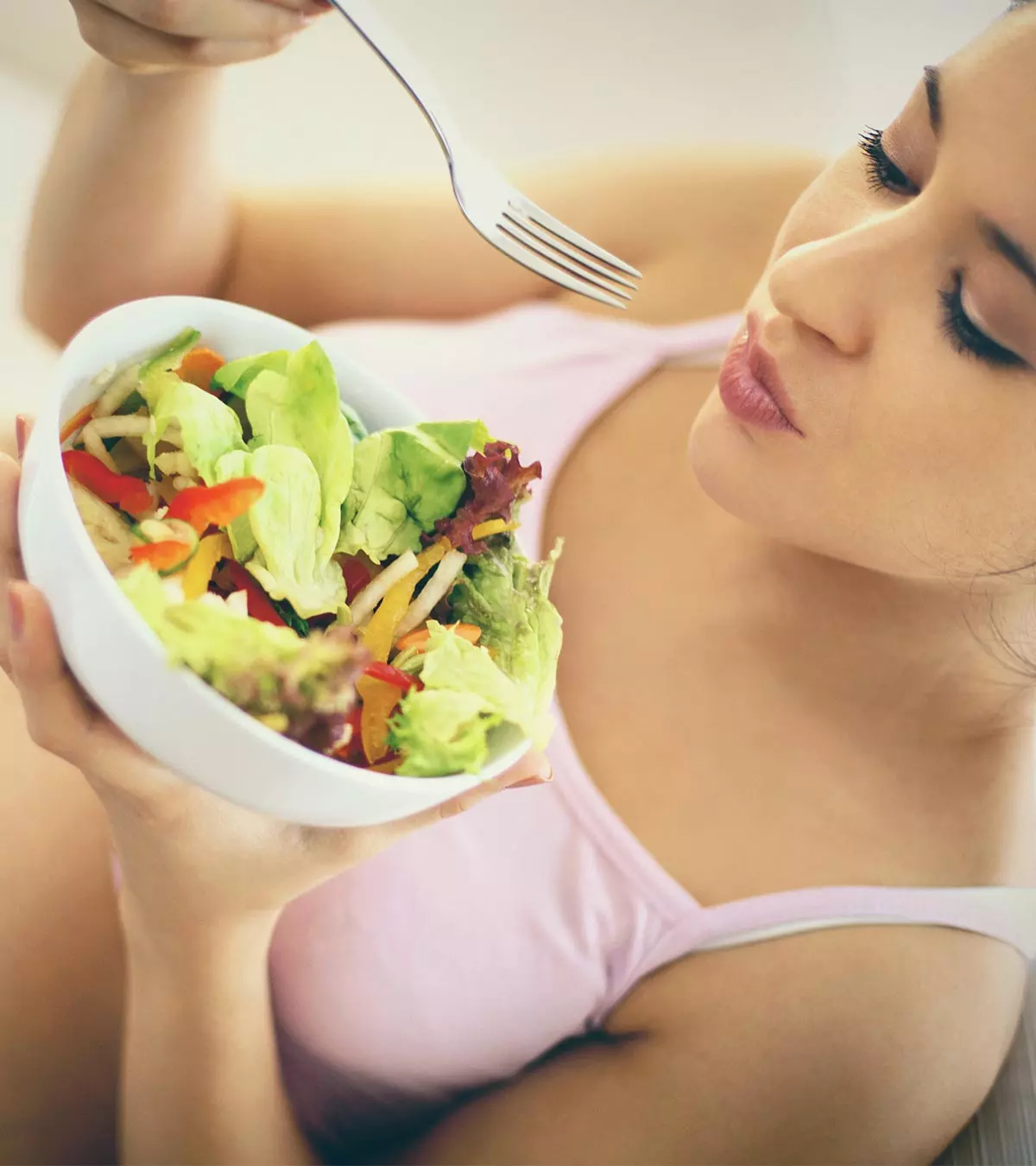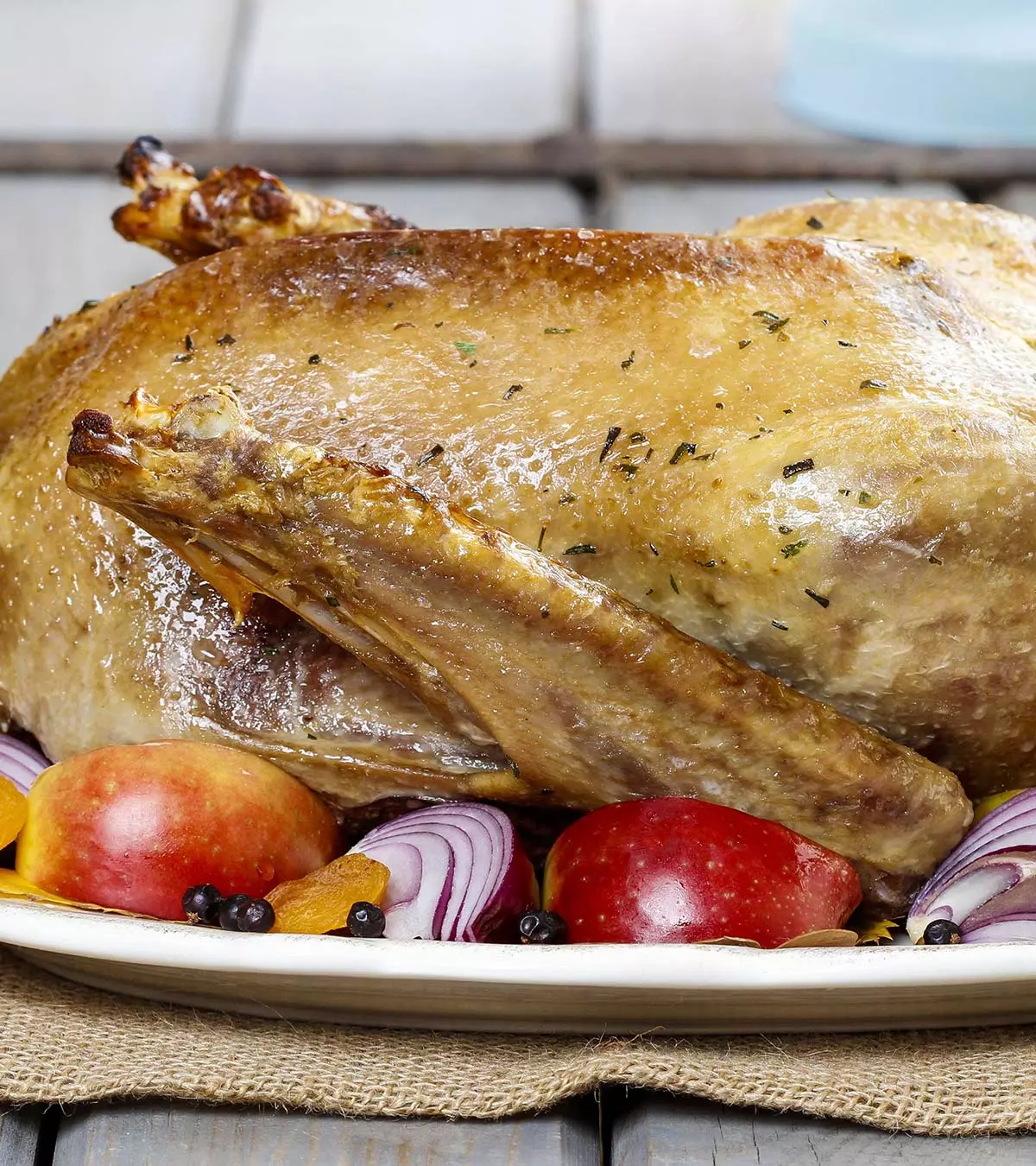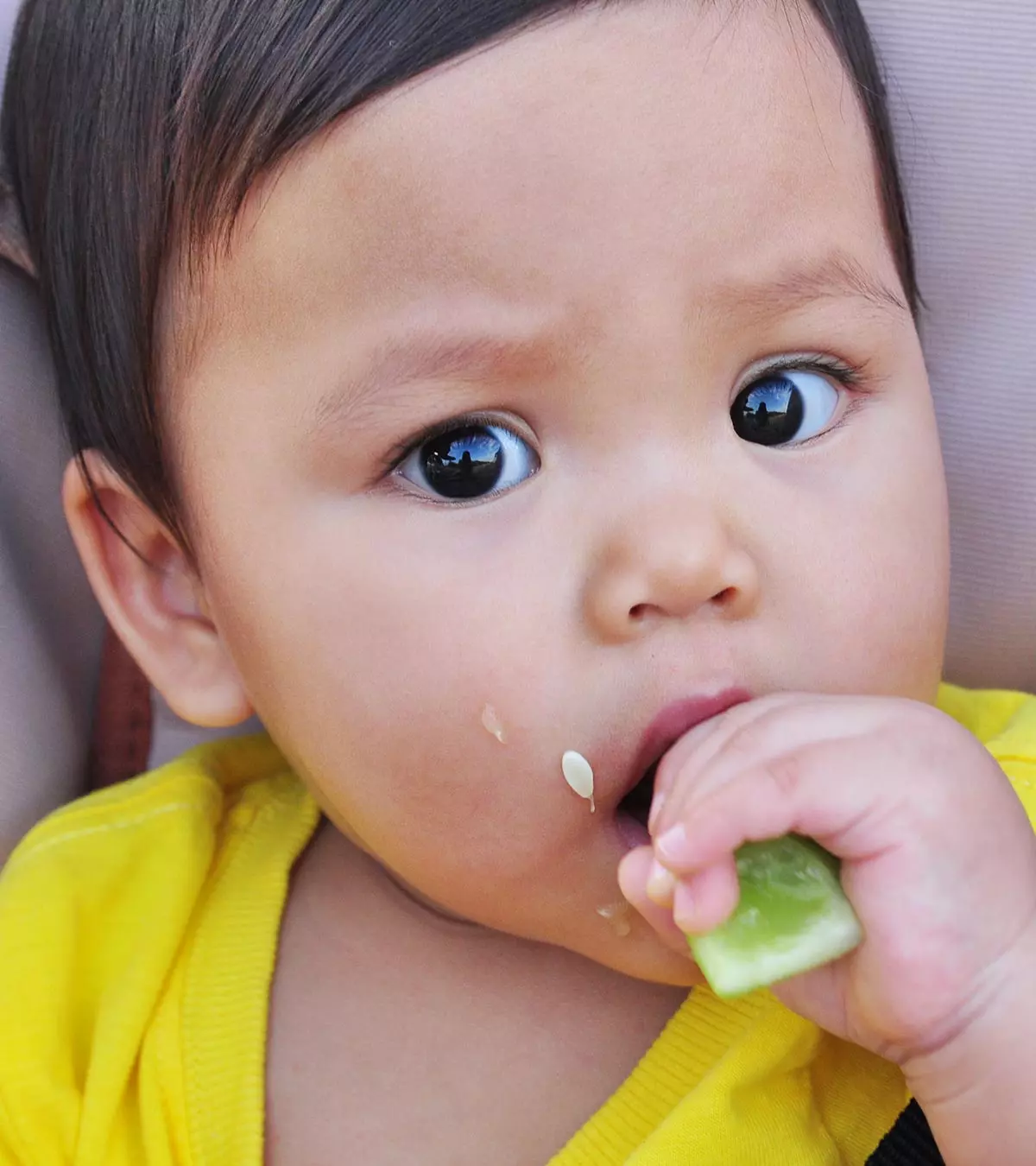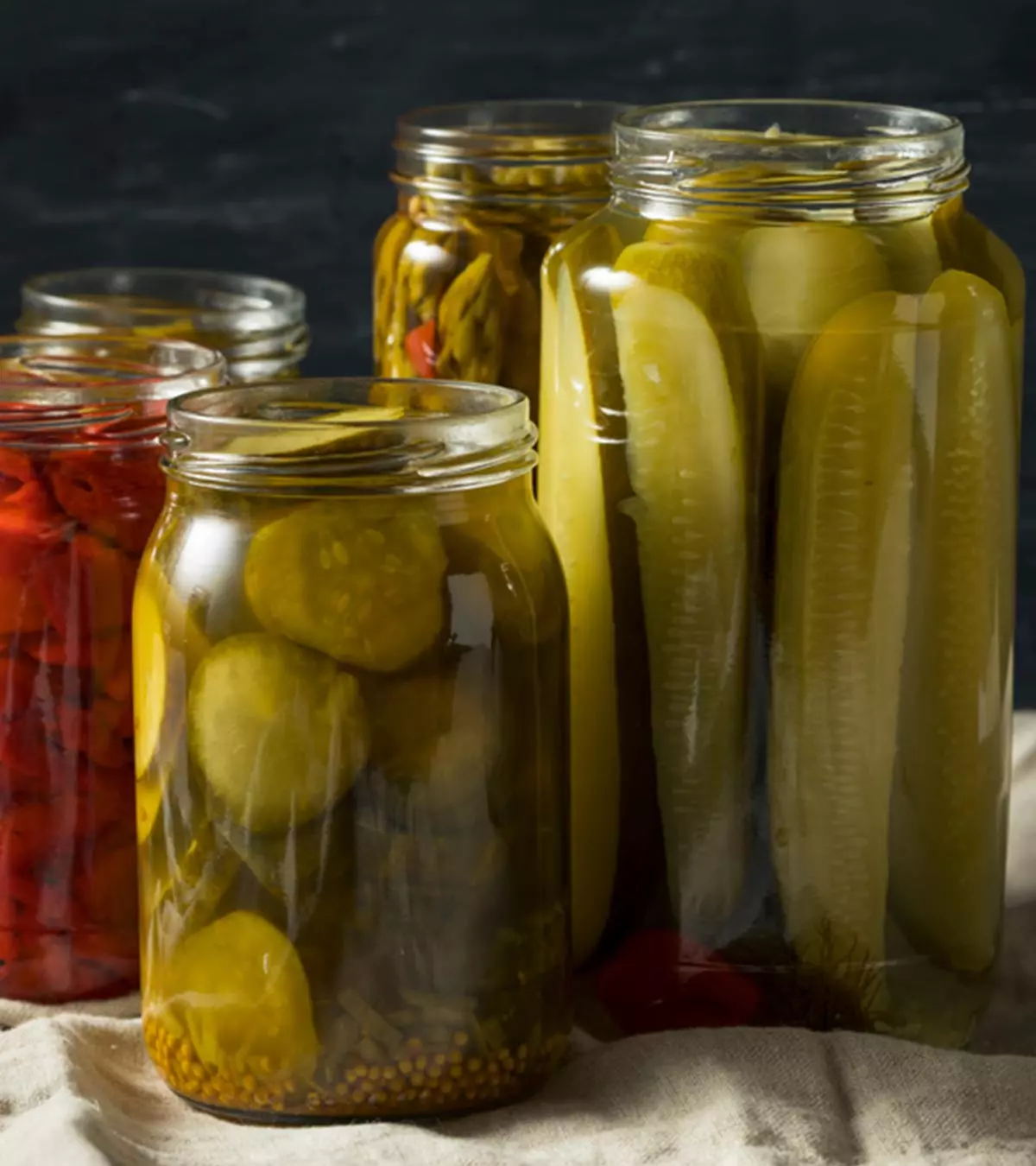
Image: Shutterstock
You might want to try pickles for babies as soon as your baby begins eating solids. Pickles are an attractive choice due to their ability to add flavor to plain food. Besides, these tangy-sour and crunchy fermented foods have specific medicinal and functional properties (1).
Pickles can be bought from a store or prepared at home by immersing the food in brine (salt or salty water) or vinegar. Evidence shows that pickling can raise a food’s shelf life and nutritional value. In addition, it can offer healthy bacteria (probiotics) that may promote gut health (2).
Read on to know about the right age to feed pickles to babies with the benefits they can offer to them.
Key Pointers
- Babies may consume pickles in small quantities after turning six months.
- Pickles contain high sodium but are beneficial as they enhance gut-friendly bacteria, support digestion, and boost immunity.
- Overconsumption of pickles may increase the risk of high blood pressure and cardiovascular disease.
- Always give naturally fermented pickles to babies. Store-bought or vinegar pickles do not have health benefits.
- Wait and watch for a few days after introducing pickles to babies to avoid chances of allergic reactions.
When Can Babies Start Eating Pickles?

Image: Shutterstock
“Babies can begin eating pickles when they start solids at around 6 months old. It can be beneficial to introduce babies to different tastes and textures and pickles are unique in both of these characteristics,” says Trista Best, Registered Dietitian at Balance Supplements Inc.
Healthy, full-term babies can occasionally consume pickles from six months of age. However, if you are unsure about using pickles for your baby, consult a pediatrician. Once a doctor allows feeding pickles to your baby, feed them pickles in small amounts only. For instance, you can give a tiny piece of cool, pickled carrot or cucumber to babies as a teething snack to suck and nibble. It will ease their gum inflammation and might also distract them from the pain and irritation.
Pickles can also serve as good finger food to hone a baby’s pincer grasp, which is vital to support effective baby-led weaning. While you give your baby pickles to eat, don’t leave them unsupervised. It is essential as pickles are raw foods that can pose a potential choking risk for babies. According to a New York State Department of Health report, choking is the fourth leading cause of unintentional death in children under five, with food-related incidents being the most common cause of nonfatal choking in young children. To ensure their safety, always serve tiny pieces or small slices of pickle to avert the risk of choking.
Are There Any Benefits Of Pickles For Babies?

Image: IStock
Although pickles contain loads of sodium, their cautious use for babies may be beneficial. Pickles have several nutrients and gut-friendly microorganisms that may promote healthy digestion, support gut health, and boost immunity (3). Also, healthy microorganisms may activate certain compounds and confer health benefits.
For instance, lactic acid bacteria can convert phenolic compounds to active metabolites that may impart specific health benefits. Furthermore, fermenting foods can reduce anti-nutrient compounds, enhancing nutrient absorption in the body.
“Pickles on store shelves aren’t typically truly fermented, which means they do not provide beneficial probiotics. Naturally fermented pickles contain these beneficial bacteria that can improve baby’s gut health,” notes Best.
So, if you want to feed pickles to your baby, use naturally fermented pickles and not vinegar-fermented versions to reap these benefits because pickles fermented with vinegar don’t have healthy bacteria or probiotics (4). Probiotics for babies hold several health benefits so feeding them pickles is a great way to strengthen your child’s overall health.
 Did you know?
Did you know?Do Pickles Raise Any Health Concerns?

Image: Shutterstock
Naturally fermented pickles are usually high in sodium, a mineral that can put an undue load on the baby’s immature kidneys (5). Besides, early exposure to salty foods may alter a toddler’s taste preferences later in life. It means that as the baby grows, they may crave salty foods and overconsume them. Overconsumption of salt can expose an individual to several health risks, such as high blood pressure and cardiovascular diseases (CVD), over time (6).
Thus, to ensure that the baby isn’t overeating sodium, read the nutrition label carefully and pick low-sodium pickles. Alternatively, you can prepare pickles at home with various foods, such as vegetables, fruits, meat, egg, dairy, and fish. Whether homemade or store-bought, feed pickles to babies occasionally and in minimum quantities of up to a tablespoon.
Pickles may cause an upset stomach or reflux due to their acidity in sensitive babies. Therefore, avoid feeding pickles to them unless your pediatrician suggests otherwise.
 Quick tip
Quick tipCan Pickles Cause A Diaper Rash?

Image: Shutterstock
Lactic acid bacteria in pickles digest sugars and produce lactic acid making the pickle acidic (7). In some sensitive babies, acidic foods, such as pickles, may irritate their skin and trigger rash around their lips, mouth, and buttocks. Alternatively, acidic foods may irritate the gut lining, causing diarrhea, which may result in baby diaper rash. To reduce the risk of diaper rash, change your baby’s diapers frequently, especially after feeding acidic foods, and use barrier creams when needed.
Pickles And Allergy

Image: IStock
Pickle allergy cases aren’t well documented. Yet, it is considered that, like any other food, pickles too can cause an allergic reaction in sensitive babies. In most cases, pickle allergy happens from additives, such as preservatives added to pickles, rather than the pickled food.
The signs and symptoms of pickle allergy are similar to that of a food allergy. If you are feeding your baby pickles, introduce it in small amounts with no new food introduced simultaneously.
Wait and watch for three to five days for any signs of intolerance or allergy. If a baby looks uncomfortable after ingesting the pickle, discontinue feeding and reintroduce it after some time, say five days or a week. In case of an allergic reaction, stop feeding pickles and consult your healthcare provider promptly.
Frequently Asked Questions
1. Is it fine if I give my baby pickle juice?
The National Health Service recommends limiting daily salt intake for children under 12 months old (8). Pickle juice contains sodium. So it would not be wise to give the baby pickle juice in large quantities every day. Also, the American Academy of Pediatrics does not recommend giving any juice to babies who have not turned a year old. The intake of juice should be kept to 4 ounces daily for babies and toddlers aged 1-3 (9).
2. What are baby pickles?
Baby pickles go by two names. In the US and France, they are called Cornichons. In the UK, they are called Gerkins. These are one to two inches in length and made from mini cucumbers. They have a mildly sweet flavor, which is why they are a good garnish option to serve with items like pates, cured sausages, and terrines.
3. Are there any alternatives to pickles that provide similar benefits for babies?
If you don’t want to give pickles to your baby, you can give them carrot sticks or small pieces of cooked vegetables. Slice cucumber for babies is another good alternative to pickles. These foods have similar textures to pickles and are healthy options for your baby.
It is usually recommended to introduce pickles to babies in small amounts after 6 months of age in healthy, full-term infants. It has the potential to improve the gut microbiota, digestion, gut health, and immunity over time. The different flavors and textures of pickles may also help your infant avoid fussy eating later in life. However, feed your infant low-sodium pickles to avoid a salty taste preference in them and limit their consumption to one spoonful. Also, keep an eye out for symptoms of allergy and intolerance while your baby is enjoying the unique texture and flavor of pickles.
Infographic: Important Consideration When Giving Pickles To Babies
Sweet-sour and savory pickles are common foods in every household and can be a good baby-led weaning food if served as finger food. If you’re thinking of giving pickles to your little one, check out the infographic below, as it explains some important things you should be mindful of. Illustration: Momjunction Design Team
Illustration: Pickles For Babies: Age Benefits And Concerns
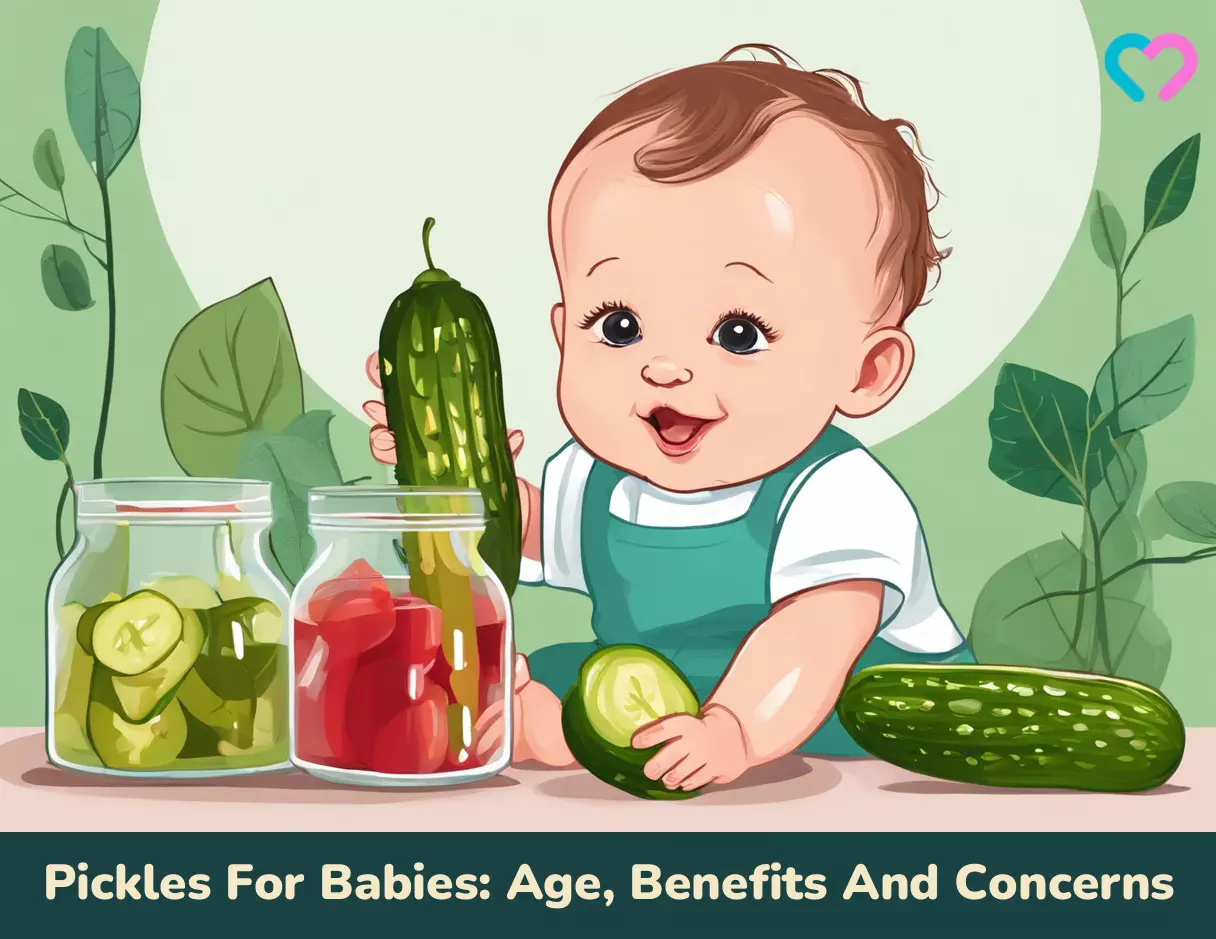
Image: Stable Diffusion/MomJunction Design Team
References
1. Pickled Vegetables; NCBI
2. Fermented foods for better gut health; Harvard Health Publishing
3. Eirini Dimidi et al.; Fermented Foods: Definitions and Characteristics, Impact on the Gut Microbiota and Effects on Gastrointestinal Health and Disease; NCBI
4. Fermented Foods for Gut Health; UMASS Medical School
5. Salt; nidirect government services
6. Early Exposure to Dietary Sugar and Salt; AAP
7. The Race Of Microorganisms; Exploratorium
8. Your baby’s first solid foods; NHS
9. AAP Recommends No Fruit Juice for Children Under 1 Year; Healthychildren.org
Community Experiences
Join the conversation and become a part of our nurturing community! Share your stories, experiences, and insights to connect with fellow parents.
Read full bio of Brianne Thompson
Read full bio of Swati Patwal
Read full bio of Rohit Garoo
Read full bio of Ghazia Shah










